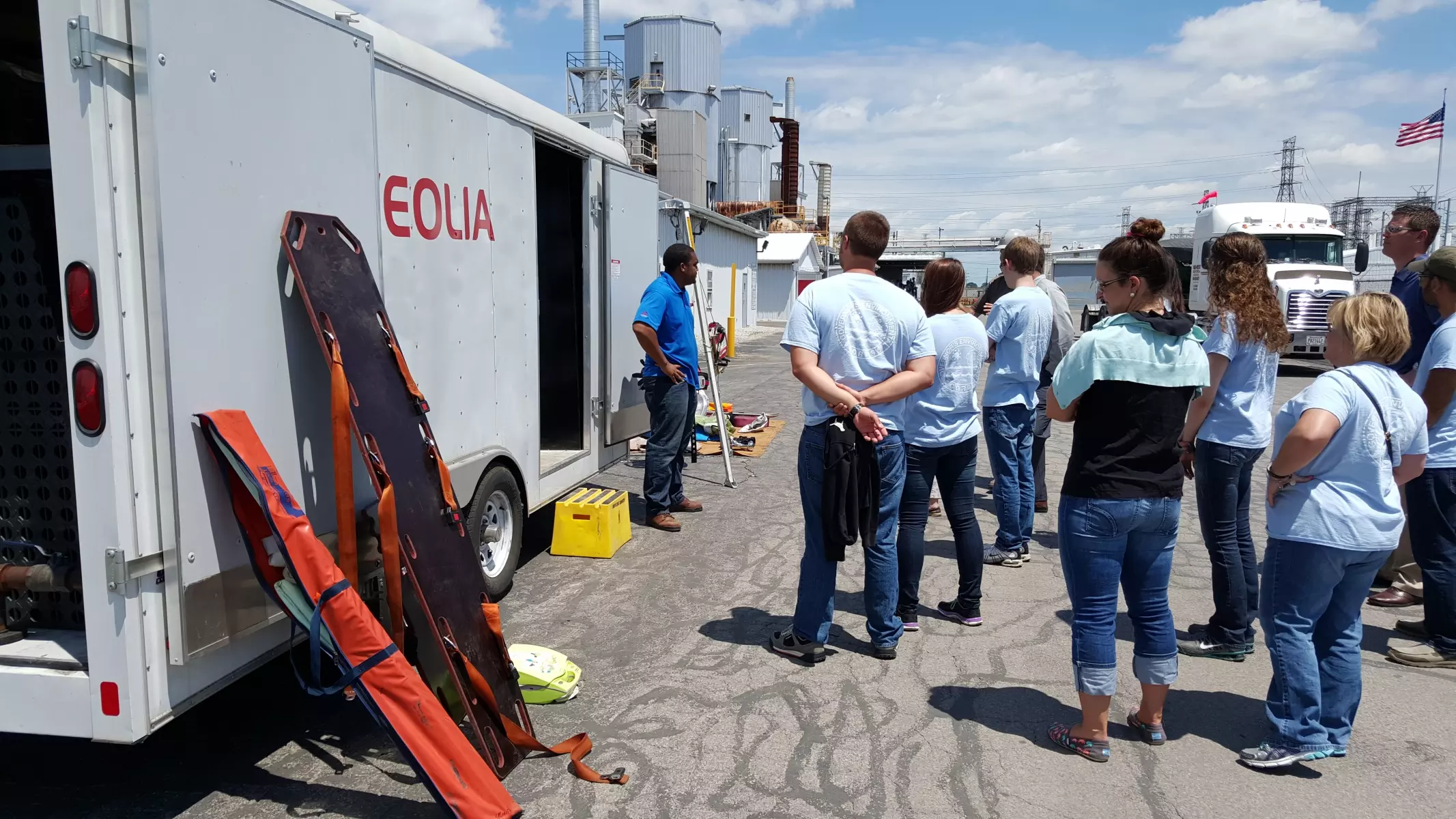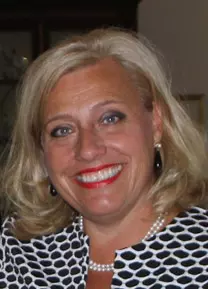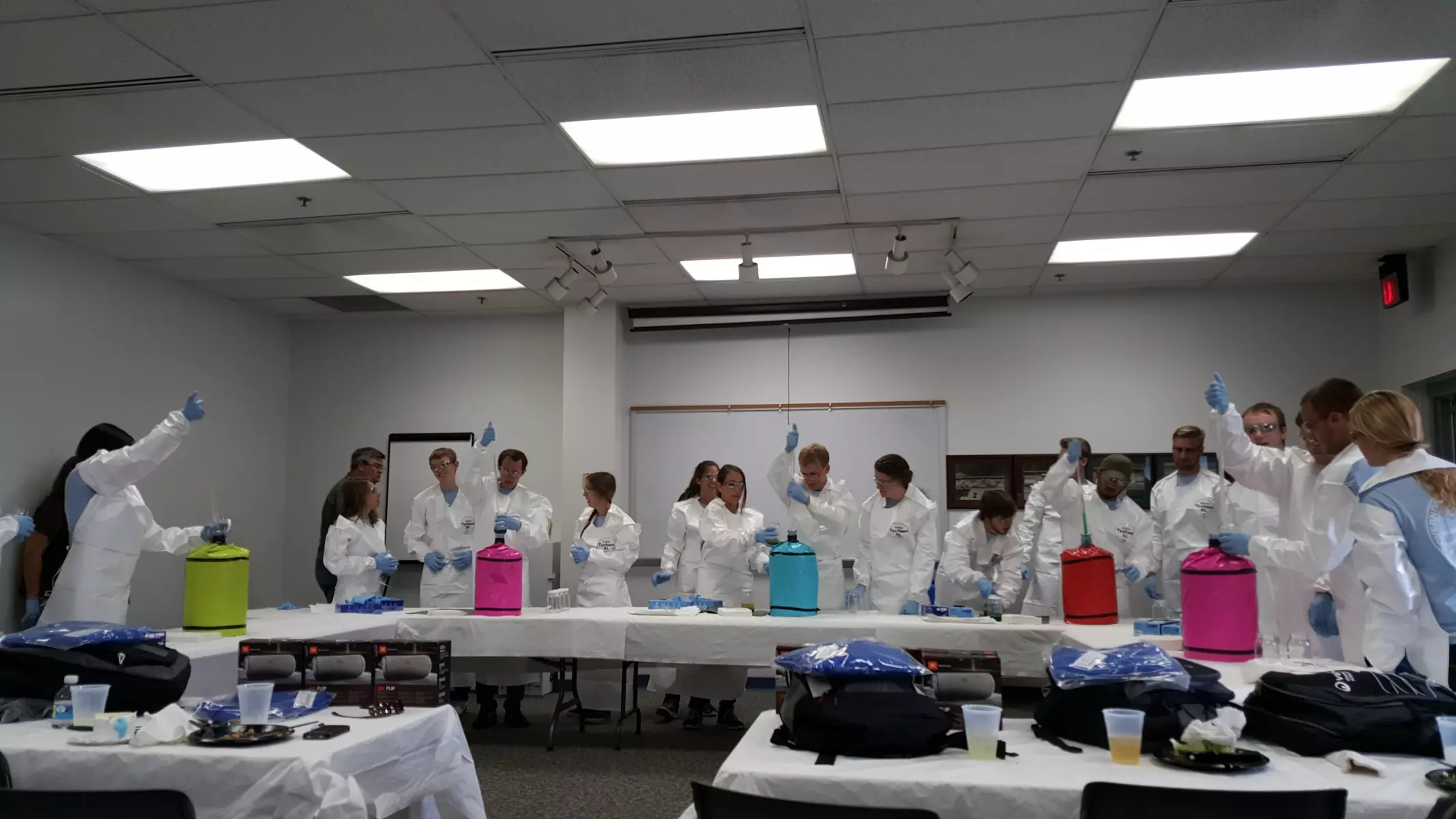
Interns receive emergency response briefing

“We thought if we could reach out to older students, we might be able to
expose them to what we do as an agency, and they would understand
better what a regulatory agency does. The thought was that they would
be better prepared for college coursework and might begin to make choices
as they study biology, the hard sciences, and engineering. We wanted them
to see the kinds of things we do here at the agency and the kinds of career
paths they might pursue.
An Interview with Sherrie Elzinga, Chief of Staff for the Director of IEPA in Springfield, IL
Learn about Illinois' program to potentially start or participate in one near you
How the Program Began
“Our internship program, the Governor's Environmental Corps (GEC), is my 24-year-old baby. I have been involved with it since the very beginning. It is one of my favorite programs that we have at the agency. I am always happy to talk about it!
“Back in 1991, the director of EPA spoke with then Governor Edgar, and they discussed the importance of teaching young people about the environment. At that point, recycling was a big craze. The idea was that if you increased the importance of recycling among the kids in kindergarten, then you could begin to influence the parents to recycle.
“We thought if we could reach out to older students, we might be able to expose them to what we do as an agency, and they would understand better what a regulatory agency does. The thought was that they would be better prepared for college coursework and might begin to make choices as they study biology, the hard sciences, and engineering. We wanted them to see the kinds of things we do here at the agency and the kinds of career paths they might pursue.
“First, we tried the program with high school graduating seniors, thinking that we could influence their career decisions. What we found was that they didn’t really have the expertise that we needed. We needed someone who was a little bit more involved in their coursework, someone who had completed a couple years of college.”
Awareness of the EPA’s Purpose
“Environmental protection really started in 1970 with the founding of the U.S. Environmental Protection Agency. It was a new field. Now, 45 years later it’s not so new, and it’s become a part of our culture. Everybody expects that we’re going to have clean air, clean water and our trash is going to disappear mysteriously. But then, everyone remembered the town dump and rivers that caught on fire in Cleveland.
“It was 21 years after the first Earth Day that we started this program. We decided that we couldn’t use high school seniors, because they did not have enough knowledge to work on our level. We have geologists, civil engineers, chemical engineers, and chemists. We needed people with a little college under their belts who would be more mature.
“We had a small program when we first started with about 10 students for the first couple of years. Then, in about ’94 or ‘95, which is when Veolia started to get involved, we went to college students doing a lot more work, real hands on work, the same work the agency employees were doing because it’s a mentoring program. The unique part is that it’s a public-private partnership, and it’s a paid internship, which is very unique for a program like this. We were able to set it up like this because of the generosity of Illinois companies like Veolia.”
Veolia’s Participation
“Veolia started participating around 1996. Veolia’s Midwest Branch Manager, Doug Harris has been a huge benefactor. He believes in the training. He’s given not only monetarily, but he’s also given in kind to the program by hosting us several times at Veolia during field trips. These are really one of a kind field trips—when are you ever going to see hazardous waste incineration? You don’t get to just go into places like that, security and safety surrounds the place.
“They give us a pretty in-depth tour. We learned from the ground up. I’d say our interns learned the safety regulations first. You need to learn that before you go through the incinerator. They spend several hours with us when we’re there. Before we go I require them to study the permits, so they know what the agency expects from Veolia, and they can see both sides of it. They see the regulator and the regulated.

Interns Sometimes Become Employees
“Sometimes we end up hiring the interns. There have been at least 25 that we’ve hired. Right now we have ten or more who are employed by us and have gone through the program. Their roles are varied
“We hired one person now whose job is site evaluations. He does soil testing at hazardous and non hazardous waste sites. Some have become lab bench chemists. One works for our office of community relations. Another was a marketing major and now works in our office of financial assistance, which is our low interest loan program to municipalities. Veolia has also hired some of our interns. One works in the laboratory.”
The Need for Sponsorships
“I think that the main reason companies that sponsor the GEC are doing it, is to be good citizens. These companies are Fortune 500 companies, so they really don’t need help in attracting employees. They really are doing it for good reasons.
“Veolia has been very generous about talking to some of their neighbors to recruit them to sponsor the program. Doug Harris has talked to the water treatment plant that they do business with, and they were a sponsor for a couple of years. We also had an ethanol plant that sponsored us for several years. Doug has been very good about spreading the word around.
“There were some years when it was very difficult to raise money for the internships, so it was very nice that he was willing to lend a hand and help me get some new people interested.”
How to Qualify for the Internship Program
“To qualify for an internship, you must be a student at a school in Illinois or live in Illinois. You must have an Illinois tie, because all of our offices are here in Illinois. You don’t need to study environmental science, or engineering. The program really is open to everyone.
“The application process opens in February through our website. We are looking for any type of student who has an interest in the environment, whether you pursue a career as a public servant, or you’re just a good citizen. People always say to me “I didn’t know you guys did this”. It’s good to have more people familiar with what we do, so more people understand our purpose.”
What You Learn
“They learn about the life of a regulatory agency—it’s like we’re environmental cops. They learn how many things we are balancing. I had a student who was a PhD candidate from University of Illinois and I thought he was way too old for this program. He already knew what he wanted to do, and he was on the professor track. He came in for his interview and said, “Look, I teach this stuff every day, but I really don’t know how it works.” He took nine weeks last summer and came to work every day from Champagne. He said it was the most valuable thing he did in all the time he was in school and that it would make him a better teacher.
“Another student we had was in the class of 1994. He went into consulting, then he started working with a chemical company in Chicago. Eventually, he became the environmental health and safety manager at that company. When he had a little extra money, he asked if he could sponsor a student in my program. Now, he’s a regular sponsor. He said the experience changed his life, it resonated with him.
“At the end of the summer we have a banquet at the Governor’s mansion, and we tell our students to bring their families and spouses. I have a lot of parents tell me, ‘before this program, I did not know what the EPA did.’ Not only are we educating the students and giving them an internship, but we are also reaching the families. It just gives everyone a bit more information. At the banquet, the director always speaks, so there’s some education there, too.
“Each intern is assigned a mentor. We have our core programs—air pollution, water pollution, and land pollution—then we also have a large group of lawyers, a laboratory, an office of emergency response, and a lot of outreach that includes community relations, director’s office, budget, and fiscal management. We even have a library, and we’ve had a library science student there. I’ve never told a student that you’re studying something we don’t do, because pretty much any curriculum that they’re studying we have a field for. We even had a music major one time.
“We have another part of the program called the junior environmental core. We select 10 or 12 of our 30 students, and they participate in camps in Springfield—Boy Scouts, Girl Scouts, environmental camps, and they put out an environmental module for 6-12 year olds. They do that twice a week, so they are out there spreading the message. That is how we are reaching the younger children, and it works really well. All the games they play are centered on environmental issues.”

